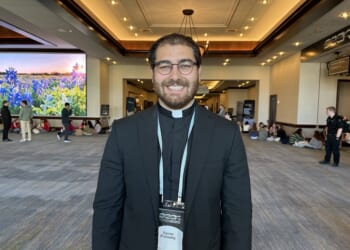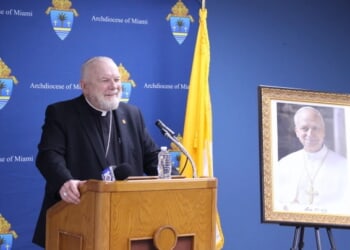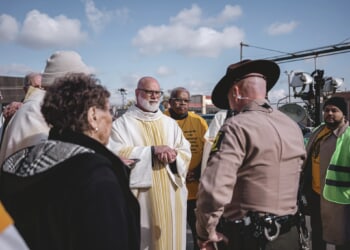CNA Staff, Nov 11, 2025 /
06:00 am
Although school vouchers were not on any statewide ballot in recent elections, the legislative push for and implementation of voucher programs is growing throughout the country, particularly in Republican-led states.
While the programs continue to receive pushback from Democrats and teachers unions, traditionally conservative groups like home-schoolers and rural residents have been increasingly voicing their disapproval.
David Tamisiea, executive director for the North Dakota Catholic Conference, said in a recent presentation at the Society for Catholic Social Scientists conference at Franciscan University of Steubenville that he was surprised when he first encountered Catholic parents who opposed educational choice in the form of school vouchers.
He defined educational choice as “the idea that parents should have the freedom to choose the educational setting best suited to their child” and said that “to be truly free, these choices should be supported with public funding.”
Tamisiea said this freedom for parents to choose their children’s education was affirmed in a document issued during the Second Vatican Council known as Gravissimum Educationis, the “Declaration on Christian Education.”
“That’s where you find the most well known of its teachings, the idea that parents are the primary educators of their children,” Tamisiea told CNA. As primary educators, parents have the “fundamental and inalienable right to see to the education of their children, a right so fundamental it cannot be taken away by the state.”
“But it doesn’t mean the state has no role,” he said.
Earlier this year, Texas Gov. Greg Abbott signed into law a $1 billion voucher program that will begin in early 2026.
Residents in the 10-county district in rural west Texas represented by state Rep. Drew Darby, R-San Angelo, opposed the program, however.
“In rural Texas, there’s not a whole lot of private school options, and we want our schools to get every dollar they can. This doesn’t add $1, and it’s not good for rural Texas,” Darby said last year of the voucher program.
The home-schooling community is divided on the idea of vouchers. Home-schooling families can spend thousands of dollars a year on books, sports, music lessons, and other classes, and some families would welcome seeing some of their tax dollars returned to them in the form of vouchers.
Others, however, are opposed to accepting public funds. In Texas, home schooling is currently unregulated by the state and local governments. Home-schooling families worry that accepting taxpayer money in the form of vouchers will lead to government mandates and overregulation.
“We do have zero oversight, zero accountability, and we want to keep it that way,” Faith Bussey, president of Texans for Homeschool Freedom, told the Texas Tribune in 2023. The organization opposed the voucher program, calling it “a real threat to parental freedom.”
These fears are not unfounded. As the Heritage Foundation documented in 2024, Arizona’s voucher program launched in 2011 with $7,000 per student and zero curriculum mandates for home-schoolers. By year three of the program, the state required standardized testing and later added vendor preapproval and bans on “divisive concepts.”
Tamisiea acknowledged that there are legitimate concerns about state overreach but said those concerns should not mean that Christians should not support publicly funded educational choice programs like school vouchers.
“It’s a matter of both/and,” he told CNA. “Parents should fight for both rights. Fight for your right to receive funding from the state to support your choices as a parent, to teach your children the way you think is best, whether that is in private, charter, or home school, and fight for your right to be the primary educator of your children and not have that be interfered with by the state.”
(Story continues below)
Subscribe to our daily newsletter
Tamisiea, an attorney, said the “right of religious liberty is involved here as well. We have a right to exercise our faith and act according to our consciences in matters of education.”
Regarding the concerns of rural parents, Tamisiea, who said he lives in a rural state, said it is a “harder question.”
“People in the rural areas feel left out because many don’t have the option of sending their kids to a private school because there aren’t any,” he said.
This is why he favors educational savings accounts (ESAs) over school vouchers. In states with ESAs, parents are given funds from the state that they can use for private school but also for tutoring, online classes, summer educational camps, and computer technology.
Those who live in rural areas could therefore benefit from ESAs, Tamisiea said.


















